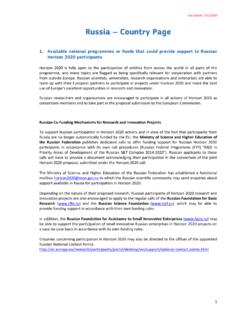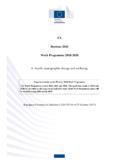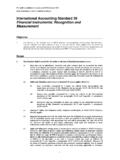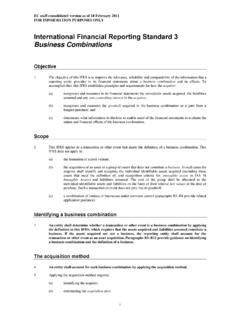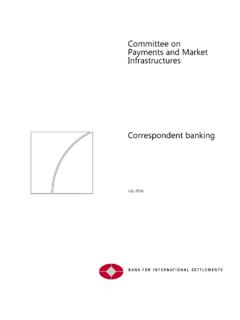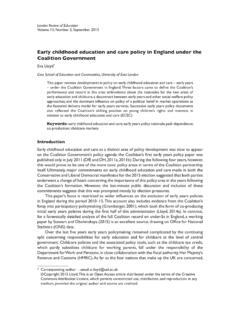Transcription of (Text with EEA relevance) - European Commission
1 EN EN European Commission Brussels, COM(2020) 825 final 2020/0361 (COD) Proposal for a REGULATION OF THE European PARLIAMENT AND OF THE COUNCIL on a Single Market For Digital Services (Digital Services Act) and amending Directive 2000/31/EC (Text with EEA relevance) {SEC(2020) 432 final} - {SWD(2020) 348 final} - {SWD(2020) 349 final} EN 1 EN EXPLANATORY MEMORANDUM 1. CONTEXT OF THE PROPOSAL Reasons for and objectives of the proposal Since the adoption of Directive 2000/31/EC1 (the e-Commerce Directive ), new and innovative information society (digital) services have emerged, changing the daily lives of Union citizens and shaping and transforming how they communicate, connect, consume and do business.
2 Those services have contributed deeply to societal and economic transformations in the Union and across the world. At the same time, the use of those services has also become the source of new risks and challenges, both for society as a whole and individuals using such services. Digital services can support achieving Sustainable Development Goals by contributing to economic, social and environmental sustainability. The coronavirus crisis has shown the importance of digital technologies in all aspects of modern life. It has clearly shown the dependency of our economy and society on digital services and highlighted both the benefits and the risks stemming from the current framework for the functioning of digital services.
3 In the Communication Shaping Europe s Digital Future 2, the Commission committed to update the horizontal rules that define the responsibilities and obligations of providers of digital services, and online platforms in particular. In doing so, the Commission has taken account of the issues identified in the European Parliament s own initiative reports and analysed the proposals therein. The European Parliament adopted two resolutions on the basis of Article 225 of the Treaty on the Functioning of the European Union (TFEU) on the Digital Services Act Improving the functioning of the Single Market 3 and on the Digital Services Act: adapting commercial and civil law rules for commercial entities operating online 4.
4 The European Parliament also adopted a resolution under the non-legislative procedure on the Digital Services Act and fundamental rights issues posed 5. In substance, the resolutions are complementary in many aspects. They include a strong call for maintaining the core principles of the e-Commerce Directive and for protecting fundamental rights in the online environment, as well as online anonymity wherever technically possible. They call for transparency, information obligations and accountability for digital services providers and advocate for effective obligations to tackle illegal content online.
5 They also advocate for public oversight at EU and national level, and cooperation between competent authorities across jurisdictions in enforcing the law, especially when addressing cross-border matters. The resolution on Digital Services Act Improving the functioning of the Single Market calls for an ambitious reform of the existing EU e-commerce legal framework while maintaining the core principles of its liability regime, the prohibition of general monitoring 1 Directive 2000/31/EC of the European Parliament and of the Council of 8 June 2000 on certain legal aspects of information society services, in particular electronic commerce, in the Internal Market (Directive on electronic commerce) (OJ L 178, , p.)
6 1). 2 3 European Parliament, Resolution on improving the functioning of the Single Market (2020/2018(INL)). 4 European Parliament, Resolution on adapting commercial and civil law rules for commercial entities operating online (2020/2019(INL)). 5 European Parliament, Resolution on the Digital Services Act and fundamental rights issues posed (2020/2022(INI)) EN 2 EN and the internal market clause, which it considers to be still valid today. Confirming the objectives of the e-Commerce Directive, the resolution calls for measures which have consumer protection at their core, by including a detailed section on online marketplaces, and which ensure consumer trust in the digital economy, while respecting users fundamental rights .
7 The resolution also advocates for rules to underpin a competitive digital environment in Europe, and envisages the Digital Services Act as a standard-setter at global level. The resolution on Digital Services Act: adapting commercial and civil law rules for commercial entities operating online calls for more fairness, transparency and accountability for digital services content moderation processes, ensuring that fundamental rights are respected, and guaranteeing independent recourse to judicial redress. The resolution also includes the request for a detailed notice-and-action mechanism addressing illegal content, comprehensive rules about online advertising, including targeted advertising, and enabling the development and use of smart contracts.
8 The non-legislative resolution on the Digital Services Act and fundamental rights issues posed highlights the need for legal clarity for platforms and users, and respect for fundamental rights given the rapid development of technology. It calls for harmonised rules for addressing illegal content online and for liability exemptions and content moderation. The resolution also includes clear reporting and transparency responsibilities for platforms and Council s Conclusions6 also welcomed the Commission s announcement of a Digital Services Act, emphasising the need for clear and harmonised evidence-based rules on responsibilities and accountability for digital services that would guarantee internet intermediaries an appropriate level of legal certainty , and stressing the need to enhance European capabilities and the cooperation of national authorities.
9 Preserving and reinforcing the fundamental principles of the Single Market and the need to enhance citizens safety and to protect their rights in the digital sphere across the Single Market . This call for action was reiterated in the Council s Conclusions of 2 October 20207. Building on the key principles set out in the e-Commerce Directive, which remain valid today, this proposal seeks to ensure the best conditions for the provision of innovative digital services in the internal market, to contribute to online safety and the protection of fundamental rights , and to set a robust and durable governance structure for the effective supervision of providers of intermediary services.
10 The proposal defines clear responsibilities and accountability for providers of intermediary services, and in particular online platforms, such as social media and marketplaces. By setting out clear due-diligence obligations for certain intermediary services, including notice-and-action procedures for illegal content and the possibility to challenge the platforms content moderation decisions, the proposal seeks to improve users safety online across the entire Union and improve the protection of their fundamental rights . Furthermore, an obligation for certain online platforms to receive, store and partially verify and publish information on traders using their services will ensure a safer and more transparent online environment for consumers.

